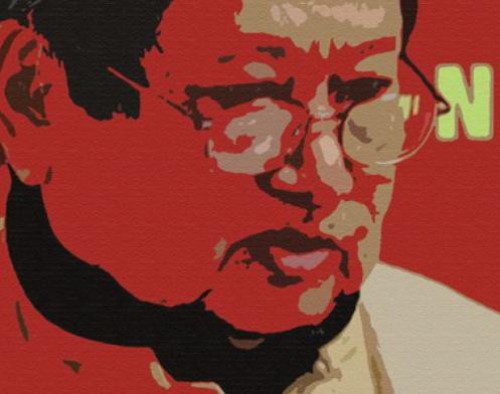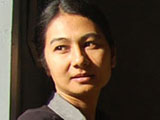Maung Swan Yi: A Burmese Encyclopedia
Poet Maung Swan Yi has been living in exile for over a decade, but he finally has hope of returning to Burma.

Maung Swan Yi’s work was banned in Burma until 2010, but that didn’t stop him from publishing. Photo: MoeMaKa Multimedia.
“Because I left my country with the fear of being arrested, I didn’t return once I got out.”
The person who told me this was Maung Swan Yi, the poet who won the Myanmar National Literature Prize for his book Poems of Red and Blue in 1964.

- In Burma if you want to hear about issues the newspapers can’t talk about, you should go to a tea shop. Tea houses were where I used to meet with other activists, writers and artists, as well as where I built friendships. Within tea houses we talked about Burmese writers, literary trends we noticed, and, of course, politics. This online space attempts to emulate the conversations I enjoyed in Rangoon’s tea houses.

- Khet Mar is a journalist, novelist, short story writer, poet, and essayist from Burma. She is the author of one novel, Wild Snowy Night, as well as several collections of short stories, essays and poems. Her work has been translated into English and Japanese, been broadcast on radio, and made into a film. She is a former writer-in-residence at City of Asylum/Pittsburgh.
Born in central Burma in 1939, Maung Swan Yi was involved with Upper Burma’s literary activities for a long time. As a young man his many jobs included: Vice secretary of Mandalay University’s student union, vice secretary of the Writers Association of Upper Burma, secretary of Mandalay University’s annual magazine committee, and secretary of the Mandalay University Pen Club.
After he got his bachelor’s degree from Mandalay University, Maung Swan Yi took on the responsibilities of educating people about Burma’s history. In light of this new role, he became a member of the Civics and History Curriculum Committee, secretary of the School Textbook Committee, and an editor of the Pyinnyatasaung Education magazine.
When the 1988 uprising happened, he became a spokesperson for the Department of Basic Education Union and helped found the Writers Union in Kamaryut township. Additionally, he was included in the “intellectual group” when the National League for Democracy Party was founded.
Soon after I started writing for magazines in 1989, I got to know Maung Swan Yi, who, understandably, is famous in Burma’s literary circles. We quickly became close because he was very welcoming and suggested newer writers and poets that I should talk to and read.
But, because of his involvement with political organizations and politicians, Maung Swan Yi was twice taken in for questioning by the police. “After that I became worried about my security,” he told me.
Then Maung Swan Yi left Burma.
In late 2002 he went to the Netherlands to read his paper “Chewing over the West” at the Asia Literature Conference at Leiden University; the next year he traveled to the United States for the International Writing Program at the University of Iowa. After that he received a year-long scholarship at Northern Illinois University’s Center for Burmese Studies.
One day, Maung Swan Yi explained to me why he remained in United States: “During my earlier time in the United States, Burma was under an isolationist military government, so it was normal that the media wanted to interview a poet from Burma. They were very interested in talking about human rights and freedom of expression in the country. How could I avoid those questions? I also thought that it was my duty as a writer/poet to share that information, so I answered them with the information they wanted to know and what I knew I should say. I was already afraid of being arrested and if I returned it was certain I would be arrested for speaking out, so I stayed.”
As Maung Swan Yi said, the military regime’s antipathy was strong. The military generals even removed one of his poems from a high school textbook that had been put into the curriculum in 1968. Neither his poems nor his writing could be published—and even his name could not be mentioned in any book in Burma—until 2010.
However, Maung Swan Yi has continued his work through exiled media. Since 2003, he has aired and published his political opinions, articles on Burma’s social and political issues, and literary pieces on exiled journals, magazines, and exiled Burmese radio and TV stations. He has also published 15 books of poetry, critical articles, book reviews, and translations.
After he left Burma I didn’t get to see Maung Swan Yi until 2007 when I came to the United States to participate in the International Writing Program. Since then we haven’t lost contact and see each other often, especially at literary events.
Maung Swan Yi is like a Burmese Encyclopedia. Whenever I want to know about Burma’s political or literary history, I call him and he tells me what I want to know with details and dates.
As of now Maung Swan Yi has been living in the States for over a decade. But with the government’s reforms he has an opportunity to return back home. Once I asked him, “Don’t you want to return?”
“Of course,” he replied, without hesitation. “I will go back in the coming spring.”
He continued, with a smile: “As a Burmese, especially an old one, I just want to live in my country. I’ve only been living outside of it because I couldn’t live where I wanted. Look: During my time in America I have been living as a Burmese, with Burmese food, Burmese habits, Burmese costume, and Burmese culture!”
He takes pride in living with his belief and love.
I pray for him now, that Burma will welcome his return with its signature fragrance, which he loves.





One Comment on "Maung Swan Yi: A Burmese Encyclopedia"
This is almost a breaking news. The love he has for the people of Burma he deserves to go back “home” without delay. We hope all the best for (Saya) Maung Swan Yi. We have nothing but love for him too! He has been an inspiration to many of us, especially when it comes to knowledge of Burma and its difficult language. He has taught us so much. There are many things Burmese individuals, students, and contemporary writers can learn from him. Thanks for this article.